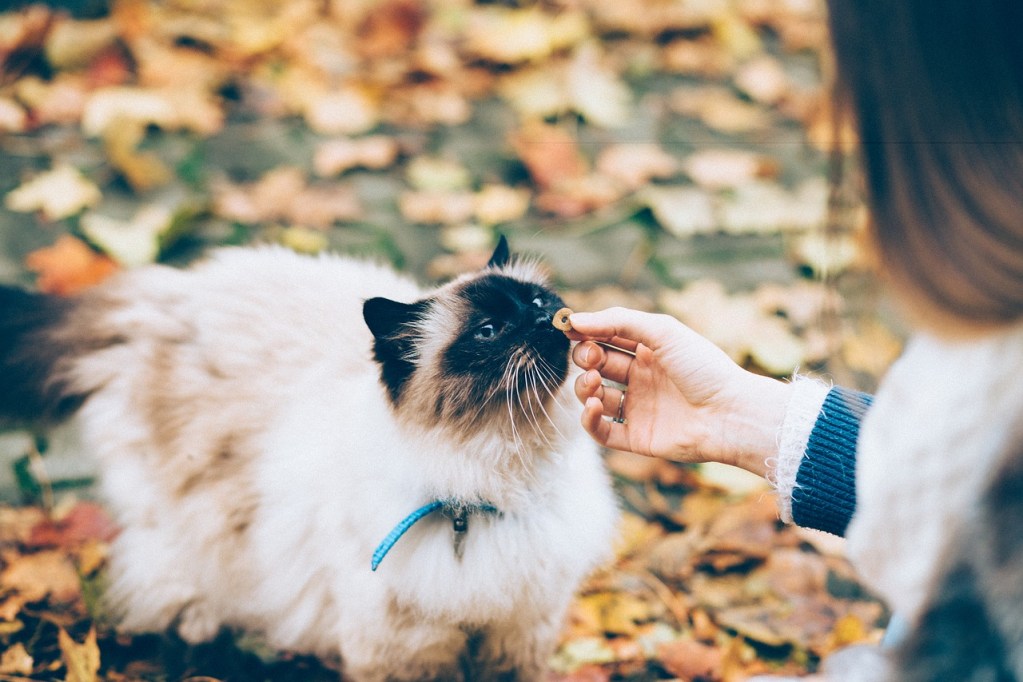Our cats are more than just furry roommates; they’re members of our family. It’s only right that they’re included in special family moments like holidays, but you need to do your research before sharing any holiday foods with your kitty to make sure they only eat Thanksgiving foods that are safe for cats.
With Thanksgiving upon us, you may be asking yourself, “Can cats eat turkey?” While there are plenty of foods you won’t be able to share with your feline friend, many common holiday staples make it onto the approved list. Stick to the ones on our list, and your fur baby will have a happy Thanksgiving this year.
1. Turkey

Have you ever wondered, “Can cats eat turkey?” The answer is yes! While you don’t want to serve your cat the crispy skin from a Cajun-fried turkey that’s been heavily seasoned with spices, a few bites of meat provide your fur baby with a delicious, protein-packed snack. But don’t give your cat more than an ounce of turkey in one sitting, or you could irritate her digestive tract.
2. Broccoli

Antioxidant-rich broccoli is yet another holiday favorite that your cat can safely enjoy. But because cats are lactose intolerant, you should serve the broccoli steamed, without butter, and unsalted. Broccoli is also high in fiber, making it a great snack for cats who suffer from occasional constipation. However, you’ll want to start off slowly if you’ve never fed your cat this veggie before. While it’s generally well tolerated, broccoli may cause flatulence, stomach cramping, and diarrhea in some cats. That’s fiber for you.
3. Apples

Your cat is in for a treat if an apple pie is a must-have on your Thanksgiving dinner menu. Like us, cats derive nutritional value from the pectin, calcium, and vitamins in apples. Apple peels also boast phytonutrients, which combine with other nutrients to improve their efficacy. Slice an apple into tiny bites — no cinnamon and sugar for your kitty — and your cat will be able to enjoy a sweet and tasty snack this Thanksgiving (remember, no seeds, plese).
4. Dinner rolls

While bread has no nutritional value for cats, a few morsels of a fully cooked dinner roll won’t cause any harm. Please refrain from giving your cat undercooked bread, as uncooked dough releases alcohol and carbon dioxide into the bloodstream. Uncooked yeast also causes swelling in the stomach, which can have potentially life-threatening consequences.
5. Pumpkin

We don’t advise feeding your fur baby a slice of pumpkin pie, but roasted or pureed pumpkin make excellent snacks for cats. Pumpkin contains fiber, calcium, potassium, vitamins, and water, so it’s nutritionally dense and hydrating. Some vets recommend pumpkin to help cats with digestive issues, so your fur baby shouldn’t suffer any gastrointestinal upset from this brightly-hued snack.
6. Bananas

Fruit salad is a common Thanksgiving dish in certain parts of the United States, especially in the South. You’ll want to skip this treat if your cat suffers from diabetes. While bananas are rich in potassium and fiber, they’re also high in sugar. You should also note that the banana’s high fiber content may cause digestive issues in some cats. When in doubt, give your fur baby a tiny bite to ensure she can digest it easily. (Remove all the stringy bits left behind by the peel; they can be a choking hazard for your kitty.)
7. Potatoes

Whether you boil them, bake them, or mash them, potatoes are a Thanksgiving Day essential. Luckily for your cat, she can eat them, too. Make sure your potatoes are thoroughly cooked before you feed them to your cat. Uncooked potatoes contain a chemical called solanine that is toxic to cats, so take precautions to properly dispose of uncooked potato peel when you’re prepping for dinner. Cats can also eat sweet potatoes, provided they aren’t drenched in butter and sugar before you serve them.
8. Green beans

Although veggies may not be the most popular dish on the table, they are chock full of vitamins and minerals that are essential for a healthy diet–for both humans and cats! Green beans are a great source of vitamins A and C, as well as calcium and fiber. This low-calorie food has virtually no fat or cholesterol, so it’s even a safe snack for cats with dietary restrictions and diabetes. However, your carnivore kitty may prefer a bite of turkey instead!
It’s important to remember that even though green beans themselves are safe for cats to eat, many green bean dishes are not. You need to consider all of the ingredients before sharing a bite of food with your cat, as something like a green bean casserole would not be feline-approved.
What foods can’t cats eat?

We’ve established that some classic feast foods will give you one happy kitty, but others should always stay off the list. On the ingredients side, avoid all spices, sugar, and lactose, including milk. These make food delicious to us but have no place in a cat’s diet and won’t sit well in her tummy.
Other things to avoid include any cooked animal bones, grapes (and raisins), stuffing, and products that contain xylitol. Some of these will just give your cat a bit of a bellyache, but others, like turkey and chicken bones, can require an emergency vet visit. Don’t hesitate to follow up with your feline doctor if she does ingest something you aren’t sure about.
Our cats are part of our family, and what better time to celebrate family than during Thanksgiving? Not all holiday foods are safe for your feline friend, so make sure to consult a list of what you shouldn’t feed your cat just to be on the safe side. When in doubt, speak to your vet before feeding your fur baby human food. Your vet knows anything in your cat’s medical history that could make human food a no-go, and they can recommend serving sizes if your cat is able to share in the family feast.




